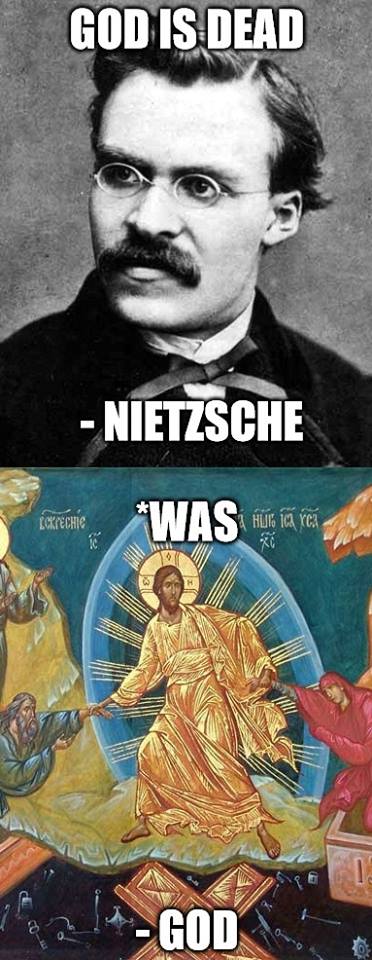Friday Frivolity: So close, Nietzsche, so close…
I know I should be posting this at Easter and not Christmas, but it made me chuckle so much I decided I just had to share it now…

"We are travellers…not yet in our native land" – St. Augustine
I know I should be posting this at Easter and not Christmas, but it made me chuckle so much I decided I just had to share it now…

In my post on Surah “Hud”, I asked a question. If there have been thousands of prophets sent by Allah, why is it that we are repeatedly told about the same ones? I mean, we hear the stories of Noah, Hud, Salih, Abraham, Lot and Moses again and again…
This piqued my curiosity, so I searched for a list on the Internet of all the prophets mentioned in the Qur’an. It turns out that, in total, twenty-five are mentioned. Here they are, together with the names used for them in the Arabic text:

So, I’ve made a decision… Once I reach the halfway point in the Qur’an (which should happen in a few days), I’m going to take a break from this series for a couple of weeks.
I’ve finally managed to make contact with a local Imam, so I’m hoping to meet him soon and start working through the large backlog of questions I’ve recorded about the chapters read thus far.
I’m sure that more than a few of you are getting a bit tired of the relentless posts about Isalm. To be honest, I’m also finding that my daily reading and writing is becoming a bit of a grind. It’s time-consuming and there are some other long-overdue posts I’d much prefer to complete!
However, as I am not quite at the halfway point, today I read the chapter of the Qur’an which is rather excitingly titled “Rock City”…
Surah 15 – “Rock City” (Al-Hijr)
We open with the affirmation that this is a “clear Qur’an [i.e. recitation]”. I will no longer point out when the Qur’an’s chapters begin like this. Hitherto, I wanted to make sure that I emphasized in these notes how often the Qur’an affirms its perspicuity.
We are told that no city was ever destroyed which had not previously received a warning of imminent destruction from one of Allah’s Messengers. This will be important for the examples which we will cover later in this surah.
We hear the common objections given by the disbelievers:


Thus far in the Qur’an we have encountered the stories of the prophets Adam, Noah, Hud, Salih, Abraham, Jacob, Shu’ayb, Moses and of Isa’s mother, Mary. Today we hear about the story of Joseph the patriarch, the one whom the Bible describes as having a “coat of many colours”:
Surah 12 – “Joseph” (Yusuf)
We open with the affirmation that the Qur’an is a “clear Book”. There is also the assertion by Allah that He is revealing “the best of stories” to Muhammad, about which he was previously unfamiliar. This seems to me to me an unlikely claim, given that Muhammad would have certainly had contact with Jews while he was a merchant trader.
We are then treated to the Islamic version of the story of the Patriach Joseph. Joseph tells his father about his dream where the sun, moon and stars bowed down to him. Jacob tells Joseph not to share this dream with his brothers, for fear they will plot against him.
(Although I’ve questioned previously whether the author of the Qur’an knew Isaac was the father of Jacob, this chapter does appear to recognize that correct relationship when Jacob is quoted as saying “[Allah will] complete His favour upon you and upon the family of Jacob, as He completed it upon your fathers before, Abraham and Isaac”)

“A new year is at hand. We cannot tell what it will bring. If it brings peace, how thankful we shall all be. If it brings us continued struggle we shall remain undaunted.”
– King George VI, Royal Christmas Broadcast 1939


As you may have noticed, as the chapters of the Qur’an have got longer, I’ve pretty much resorted to only doing only one a day. Yesterday, I went back and recaculated when I’m going to finish the Qur’an. I’ve concluded that, if I stay at a rate of about one hundred verses a day, I should be finishing the Qur’an at the end of January.
Here are today’s verses:
Surah 11 – “Hud” (Hud)
The first few pages of this chapter are filled with very standard stuff:
 The Acton Institute presents an evening with G.K. Chesterton:
The Acton Institute presents an evening with G.K. Chesterton: